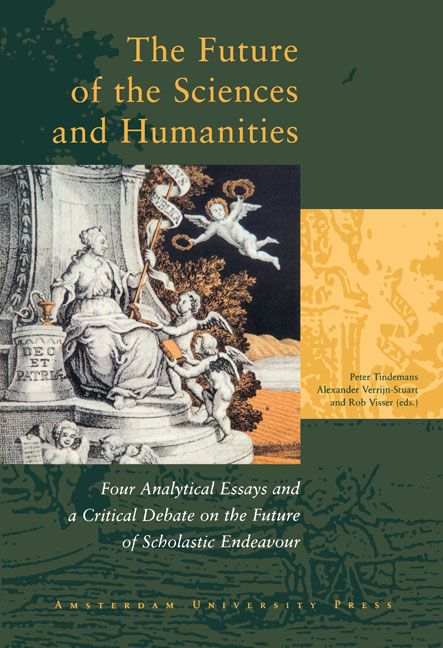 The Future of the Sciences and Humanities
The Future of the Sciences and Humanities Book contents
- Frontmatter
- Preface
- Contents
- 1 The Sciences and Arts Debate A review and some conclusions
- 2 Historical and Structural Approaches in the Natural and Human Sciences .
- The Role of Laws and Contingency in History
- 3 Science and Society in Flux
- Does A New Kind of Science Require a New Kind of Scholar or a New Kind of University?
- 4 Science for the 21st Century
- Redrawing Disciplinar Boundaries – but to What Degree?
- 5 Science and Democracy
- Science and Democracy: a Difficult Relationship: ‘An enlightened and elitist essay on an unresolvable problem’
- 6 Epilogue
- 7 Appendix
The Role of Laws and Contingency in History
Published online by Cambridge University Press: 03 February 2021
- Frontmatter
- Preface
- Contents
- 1 The Sciences and Arts Debate A review and some conclusions
- 2 Historical and Structural Approaches in the Natural and Human Sciences .
- The Role of Laws and Contingency in History
- 3 Science and Society in Flux
- Does A New Kind of Science Require a New Kind of Scholar or a New Kind of University?
- 4 Science for the 21st Century
- Redrawing Disciplinar Boundaries – but to What Degree?
- 5 Science and Democracy
- Science and Democracy: a Difficult Relationship: ‘An enlightened and elitist essay on an unresolvable problem’
- 6 Epilogue
- 7 Appendix
Summary
It was a great pleasure to study James McAllister's essay, not in the least because he discusses the development of the sciences from the perspective of their internal dynamics. Moreover, as a matter of fact, I found myself largely in agreement with his conclusions. But it is my task to start a critical debate, so that is what I will set out now to do by focussing on three main points.
THE HISTORICAL ELEMENT DETERMINES THE ACTUAL WORLD NOT ONLY BY CONTINGENT EVENTS AND PROCESSES BUT BY INSTANTIATION OF LAWS AS WELL
The conclusion of McAllister is that
“The structural element determines the set of physically possible worlds within which the actual universe finds itself; the historical element determines which of these physically possible worlds, and in what order of succession, the universe comes to instantiate in its development.”
I support the image of the actual universe as one instantiated out of the many possible universes, but it is not clear how this historical element determines it. In the introduction, McAllister states that in the historical approach “the world comes to have the structure that it has as a result of contingent historical events and processes”. But it is not true that all historical events and processes are contingent. While general laws (McAllister's structural element) are not bound to time and space, the events and processes that they determine (instantiations of laws, as we call them) most certainly are. Let us take two examples.
On 1 January 2002 we witnessed the introduction of the euro. This historical event took place on the organizational level of societies. In their account of this phenomenon, sociologists, economists and political scientists can refer only to a limited number of generalized patterns, because their disciplines have been unable to discover many. Most of their account will contain descriptions of contingent events and processes. The generalized patterns that are available are not powerful enough to predict with any plausibility the date of the next international currency transition.
Our second example concerns the total solar eclipse of 11 August |1999. This historical event took place on the organizational level of planetary systems. In their account of this phenomenon, astronomers need to refer simply to the law of gravitation of which this event is an instantiation.
- Type
- Chapter
- Information
- The Future of the Sciences and HumanitiesFour Analytical Essays and a Critical Debate on the Future of Scholastic Endeavor, pp. 55 - 62Publisher: Amsterdam University PressPrint publication year: 2002


